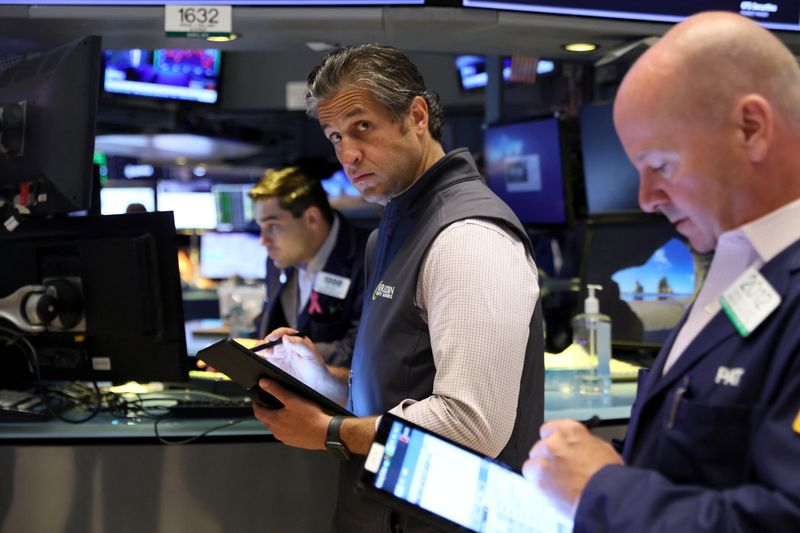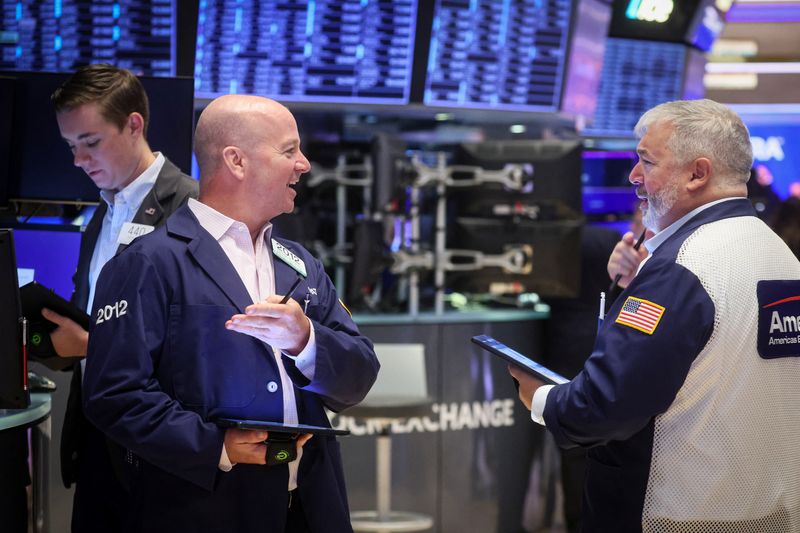By Sinéad Carew, Sruthi Shankar and Johann M Cherian
(Reuters) - The Nasdaq managed a small gain on Wednesday with support from megacap stocks while the S&P 500 and the Dow closed lower after U.S. Federal Reserve Chair Jerome Powell signaled more rate hikes and said he did not see inflation falling to the central bank's target rate "this year or next year."
At a European Central Bank forum on Wednesday, Powell also said the Fed will likely raise rates further and did not rule out a boost at the next policy meeting scheduled for late July.
But while the S&P spent most of the session in the red, investors appeared to take Powell's comments in stride because of signs of strength in the economy, according to Quincy Krosby, Chief Global Strategist for LPL Financial (NASDAQ:LPLA).
"A stronger underpinning for the economy suggests that a recession is still not expected in the immediate future, and given the resiliency in the labor market, the economy can probably digest a 25 basis point rate hike," at the Federal Open Market Committee's next meeting, said Krosby.
With inflation still high, Phil Blancato CEO Ladenburg Asset Management said Powell is "not wrong" to keep policy tight. He also noted seasonal trends with the July 4 U.S. Independence Day holiday coming up "after an incredible first six months of the year for growth stocks."
"The market's more than happy to take a breather here," he said. Traders now see an 79.4% chance of the Fed hiking interest rates by 25 basis points to a 5.25%-5.50% range in July and expect the central bank to hold rates through the end of 2023, according to CMEGroup's Fedwatch tool.
The Dow Jones Industrial Average fell 74.08 points, or 0.22%, to 33,852.66, the S&P 500 lost 1.55 points, or 0.04%, to 4,376.86 and the Nasdaq Composite added 36.08 points, or 0.27%, to 13,591.75.
Apple Inc (NASDAQ:AAPL) hit an all-time high during the session and registered a record closing high for the second session in a row. Tesla (NASDAQ:TSLA), Microsoft (NASDAQ:MSFT) and Alphabet (NASDAQ:GOOGL) were also some of the S&P's biggest boosts.
But chipmaker Nvidia (NASDAQ:NVDA), a favorite among investors looking to bet on artificial intelligence, closed down 1.8% and was the benchmark's top drag after the Wall Street Journal reported the United States could impose new curbs on exports of AI chips to China.
Four of the S&P 500's 11 major sectors advanced, with energy up 1% while communications services added 0.8%. Leading decliners was defensive utilities, which ended down 1.5%.
LPL's Krosby also welcomed an advance in the Russell 2000 small cap stock index, which added 0.5% for its third straight day of gains, in a market that has depended heavily on megacaps for gains this year.
"With the Russell's gains, concerns over a top heavy, narrow market are somewhat assuaged as small and mid-sized companies are enjoying investor interest," she said.
Investors await the Personal Consumption Expenditures (PCE) index reading, the Fed's favored inflation gauge, initial jobless claims data and the final reading of first-quarter GDP later this week to assess the state of the U.S. economy.
The S&P banks index slipped 0.5% ahead of the Fed's annual stress test results after markets close on Wednesday. The test helps determine how much capital banks need to keep in reserve and how much they have for stock buybacks and dividends.
Netflix Inc (NASDAQ:NFLX), also one of the S&P's biggest boosts, climbed 3% after Oppenheimer raised it price target.
General Mills (NYSE:GIS) sank 5% after the packaged food maker forecast full-year profit below analysts' estimates.
Advancing issues outnumbered declining ones on the NYSE by a 1.21-to-1 ratio; on Nasdaq, a 1.11-to-1 ratio favored advancers.

The S&P 500 posted 39 new 52-week highs and 6 new lows; the Nasdaq Composite recorded 70 new highs and 127 new lows.
On U.S. exchanges 9.89 billion shares changed hands compared with the 11.57 billion average for the last 20 sessions.
